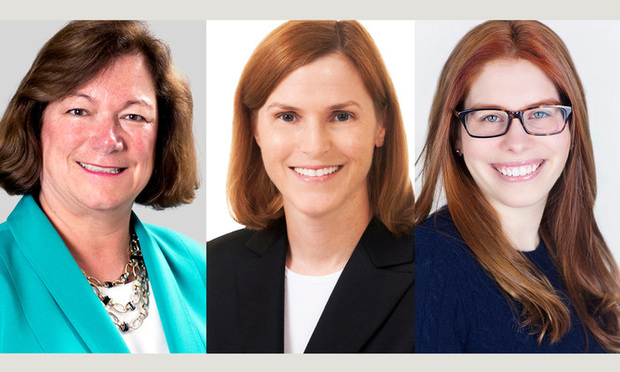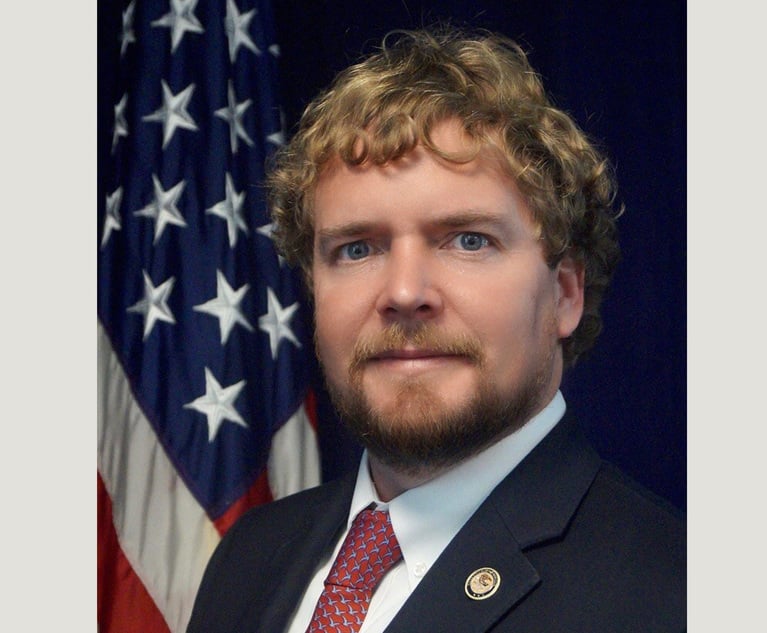Pay Equity Practices Take Off as New Gender Pay Gap Laws Spread
Tougher pay equity laws have brought new opportunities for plaintiffs—and new business for employment firms on both sides.
June 24, 2019 at 01:11 PM
8 minute read
 New Jersey-based Kathy Caminiti of Fisher & Phillips (from left), San Diego-based Denise Visconti from Littler Mendelson, and Ali Harwin of Sanford Heisler in New York (Courtesy photos)
New Jersey-based Kathy Caminiti of Fisher & Phillips (from left), San Diego-based Denise Visconti from Littler Mendelson, and Ali Harwin of Sanford Heisler in New York (Courtesy photos)
As the national conversation around gender discrimination sparks tougher fair pay laws in states such as California, New York and New Jersey, large law firms have responded with a proliferation of pay equity practices to help clients navigate the changing landscape.
National labor and employment firms Littler Mendelson and Fisher & Phillips were at the vanguard, creating freestanding pay equity practices around 2016 that offer pay gap audits and compliance counseling as well as litigation defense.
“The increased focus on pay equity in the media, courts, legislatures and on social media has certainly filtered down and caused an uptick in the number of lawsuits we're seeing that touch on pay equity issues,” said Littler's practice head, Denise Visconti.
Fisher Phillips' pay equity practice co-leaders also say they are busy and getting busier. “We saw that it was becoming a hot issue—and likely will be for decades to come,” said employment litigator Kathy Caminiti, who co-chairs the practice with Cheryl Pinarchick and Cheryl Behymer.
At national plaintiffs firm Sanford Heisler Sharp, which has aggressively pursued mass gender discrimination suits against employers, there has been a sharp uptick since 2016 in calls from women with pay discrimination claims, said its Title VII practice co-chair, Alexandra Harwin.
Sanford Heisler has brought at least a dozen class or collective action suits alleging gender pay discrimination against large companies and major law firms in that time, Harwin said, and more are in the offing. The plaintiffs firm also handles numerous individual claims, she added, but most of those settle confidentially.
The legal industry has been a “hotbed for pay discrimination claims,” Harwin said. “I know that trend will continue.”
The plaintiffs firm has filed multiplaintiff suits against Chadbourne & Parke (now part of Norton Rose Fulbright); Ogletree, Deakins, Nash, Smoak & Stewart; Jones Day; Morrison & Foerster; and Proskauer Rose.
Harwin said Sanford Heisler is hearing from additional women lawyers at both law firms and corporate legal departments. “They are seeing their peers and other women they admire come forward and speak candidly about the tough road they've walked at their firms or companies as they've tried to fight for equal pay,” she said.
Culture Shift
The federal Equal Pay Act has been on the books since 1963, but it has resulted in very few lawsuits over discriminatory pay practices because it lacks teeth in that area, Littler's Visconti said. But the plethora of new state pay equity laws are a different matter.
Visconti, who is in San Diego, said Littler started thinking about a pay equity practice in 2015 when a new fair pay bill appeared before the California Legislature.
Patricia Arquette made news at the Academy Awards that year for demanding wage equality for women in her Oscar acceptance speech for “Boyhood,” Visconti noted, and the next day state senator Hannah-Beth Jackson introduced the bill that would become the California Fair Pay Act.
Visconti tracked the bill's progress through the Legislature with an eye to compliance issues for clients, and, following the California Fair Pay Act's passage, Littler created a pay audit team to help employers assess their compensation practices.
After the California law took effect in January, 2016, Visconti said, “other states jumped on board,” including New York, New Jersey, Massachusetts, Maryland and Washington, D.C.
“That confirmed that it's a practice area that was needed,” she said.
Atlanta-based Fisher Phillips had started thinking about a freestanding pay equity practice by the summer of 2016, co-head Pinarchick said, when presidential candidate Hillary Clinton called for stricter pay transparency laws to close the wage gap between men and women.
Earlier that year, the Obama administration had issued an executive order to broaden the Equal Employment Opportunity Commission's data-reporting requirements on pay and worker demographics for companies with 100 or more employees. The new rule required far more detailed data, with tallies of employees by gender, and race or ethnicity across 12 pay bands and 10 job categories to help the EEOC spot potential pay discrimination.
“It became this national conversation,” Pinarchick said, which intensified in 2017 with the #MeToo movement.
Employer pay gap audits underpin Fisher Phillips and Littler's pay equity practices. Fisher Phillips has performed them for clients ranging from 150 employees to one in Massachusetts with 56,000 employees, Pinarchick said, adding that corporate boards and shareholders often ask for the audits.
Fisher Phillips has 20 dedicated lawyers on its team, plus paralegals, Caminiti said, and more people interested in joining.
Littler has about 10 lawyers and another 10 undergoing subject matter training for the team, Visconti said, plus a cadre of data scientists and a lawyer with a PhD in statistics.
New Avenues for Plaintiffs
The new EEOC pay reporting requirement “has caused consternation to a lot of employers,” said Fisher Phillips' Behymer.
Companies believed it would not go forward under the Trump administration, she explained, which had obtained a stay. But Judge Tanya Chutkan of the U.S. District Court for the District of Columbia reinstated the Obama-era rule in April, ruling the Trump administration's attempt to rescind it didn't follow lawful procedures. She set a Sept. 30 deadline for the EEOC to start collecting data for 2017 and 2018, which the Justice Department has appealed.
The more sweeping reporting requirement doesn't impose any immediate financial penalties, Behymer said, but it could help plaintiffs lawyers with pay discrimination suits.
Employers must give the government much more detailed salary data—for the first time pinpointing pay for men compared with women, and by ethnicity or race, across 12 salary ranges and 10 job categories—and the data is subject to FOIA requests.
“It could be very troublesome to an employer with a pay-parity problem who is taking the trouble to report,” Caminiti said. “Now that data is available to plaintiffs lawyers on a silver platter.”
The new state fair pay laws also could help plaintiffs lawyers. With Trump's election, states decided no new federal pay equity legislation would be forthcoming. “Since then, there's been an avalanche of state laws enacted—some quite quickly,” Caminiti said.
Littler's Visconti said the new laws have “changed the conversation.”
They are more plaintiff-friendly for pay discrimination claims than the federal Equal Pay Act, offering more expansive protections for broader classes of employees, with lower burdens of proof, richer damages and extended statutes of limitations.
For instance, New Jersey's law, effective mid-2018, and New York's, effective Jan. 1, 2017, allow monetary damages for up to six years from the first discriminatory pay period. Liquidated damages, formerly limited to the amount of the wrongful pay gap, are now treble.
What's more, New Jersey and other states allow plaintiffs to make pay discrimination claims for work that is “substantially similar,” which is much broader than the “equal pay for equal work” standard of the Equal Pay Act and older state laws that assessed pay discrimination only for identical jobs.
New Jersey's law is the broadest in the country, requiring employers to consider pay disparities for “substantially similar work,” not only for men compared with women but also for employees of different races, ages and other protected categories.
Fisher Phillips has created an interactive map that tracks pay equity laws by state, including Alabama, which just passed one this month.
Littler's clients have seen a marked uptick nationally in pay discrimination claims, Visconti said, and they have not been limited to states with new pay equity laws. Littler has handled several hundred suits in the past two years that “touched on some element of pay equity,” she said, including as part of a broader wrongful termination or bias suit.
“I think we're seeing just the tip of the iceberg for this litigation,” said Fisher Philips' Caminiti, who added that early litigation under the new state laws is settling for hundreds of thousands, and sometimes millions of dollars. “It's high-stakes litigation that we expect will continue to grow.”
There haven't been any jury verdicts yet under the robust New York or New Jersey laws, she said. “They've just now been on the books long enough for plaintiffs lawyers to take notice.”
This content has been archived. It is available through our partners, LexisNexis® and Bloomberg Law.
To view this content, please continue to their sites.
Not a Lexis Subscriber?
Subscribe Now
Not a Bloomberg Law Subscriber?
Subscribe Now
NOT FOR REPRINT
© 2025 ALM Global, LLC, All Rights Reserved. Request academic re-use from www.copyright.com. All other uses, submit a request to [email protected]. For more information visit Asset & Logo Licensing.
You Might Like
View All


Trending Stories
- 1Who Are the Judges Assigned to Challenges to Trump’s Birthright Citizenship Order?
- 2Litigators of the Week: A Directed Verdict Win for Cisco in a West Texas Patent Case
- 3Litigator of the Week Runners-Up and Shout-Outs
- 4Womble Bond Becomes First Firm in UK to Roll Out AI Tool Firmwide
- 5Will a Market Dominated by Small- to Mid-Cap Deals Give Rise to a Dark Horse US Firm in China?
Who Got The Work
J. Brugh Lower of Gibbons has entered an appearance for industrial equipment supplier Devco Corporation in a pending trademark infringement lawsuit. The suit, accusing the defendant of selling knock-off Graco products, was filed Dec. 18 in New Jersey District Court by Rivkin Radler on behalf of Graco Inc. and Graco Minnesota. The case, assigned to U.S. District Judge Zahid N. Quraishi, is 3:24-cv-11294, Graco Inc. et al v. Devco Corporation.
Who Got The Work
Rebecca Maller-Stein and Kent A. Yalowitz of Arnold & Porter Kaye Scholer have entered their appearances for Hanaco Venture Capital and its executives, Lior Prosor and David Frankel, in a pending securities lawsuit. The action, filed on Dec. 24 in New York Southern District Court by Zell, Aron & Co. on behalf of Goldeneye Advisors, accuses the defendants of negligently and fraudulently managing the plaintiff's $1 million investment. The case, assigned to U.S. District Judge Vernon S. Broderick, is 1:24-cv-09918, Goldeneye Advisors, LLC v. Hanaco Venture Capital, Ltd. et al.
Who Got The Work
Attorneys from A&O Shearman has stepped in as defense counsel for Toronto-Dominion Bank and other defendants in a pending securities class action. The suit, filed Dec. 11 in New York Southern District Court by Bleichmar Fonti & Auld, accuses the defendants of concealing the bank's 'pervasive' deficiencies in regards to its compliance with the Bank Secrecy Act and the quality of its anti-money laundering controls. The case, assigned to U.S. District Judge Arun Subramanian, is 1:24-cv-09445, Gonzalez v. The Toronto-Dominion Bank et al.
Who Got The Work
Crown Castle International, a Pennsylvania company providing shared communications infrastructure, has turned to Luke D. Wolf of Gordon Rees Scully Mansukhani to fend off a pending breach-of-contract lawsuit. The court action, filed Nov. 25 in Michigan Eastern District Court by Hooper Hathaway PC on behalf of The Town Residences LLC, accuses Crown Castle of failing to transfer approximately $30,000 in utility payments from T-Mobile in breach of a roof-top lease and assignment agreement. The case, assigned to U.S. District Judge Susan K. Declercq, is 2:24-cv-13131, The Town Residences LLC v. T-Mobile US, Inc. et al.
Who Got The Work
Wilfred P. Coronato and Daniel M. Schwartz of McCarter & English have stepped in as defense counsel to Electrolux Home Products Inc. in a pending product liability lawsuit. The court action, filed Nov. 26 in New York Eastern District Court by Poulos Lopiccolo PC and Nagel Rice LLP on behalf of David Stern, alleges that the defendant's refrigerators’ drawers and shelving repeatedly break and fall apart within months after purchase. The case, assigned to U.S. District Judge Joan M. Azrack, is 2:24-cv-08204, Stern v. Electrolux Home Products, Inc.
Featured Firms
Law Offices of Gary Martin Hays & Associates, P.C.
(470) 294-1674
Law Offices of Mark E. Salomone
(857) 444-6468
Smith & Hassler
(713) 739-1250







